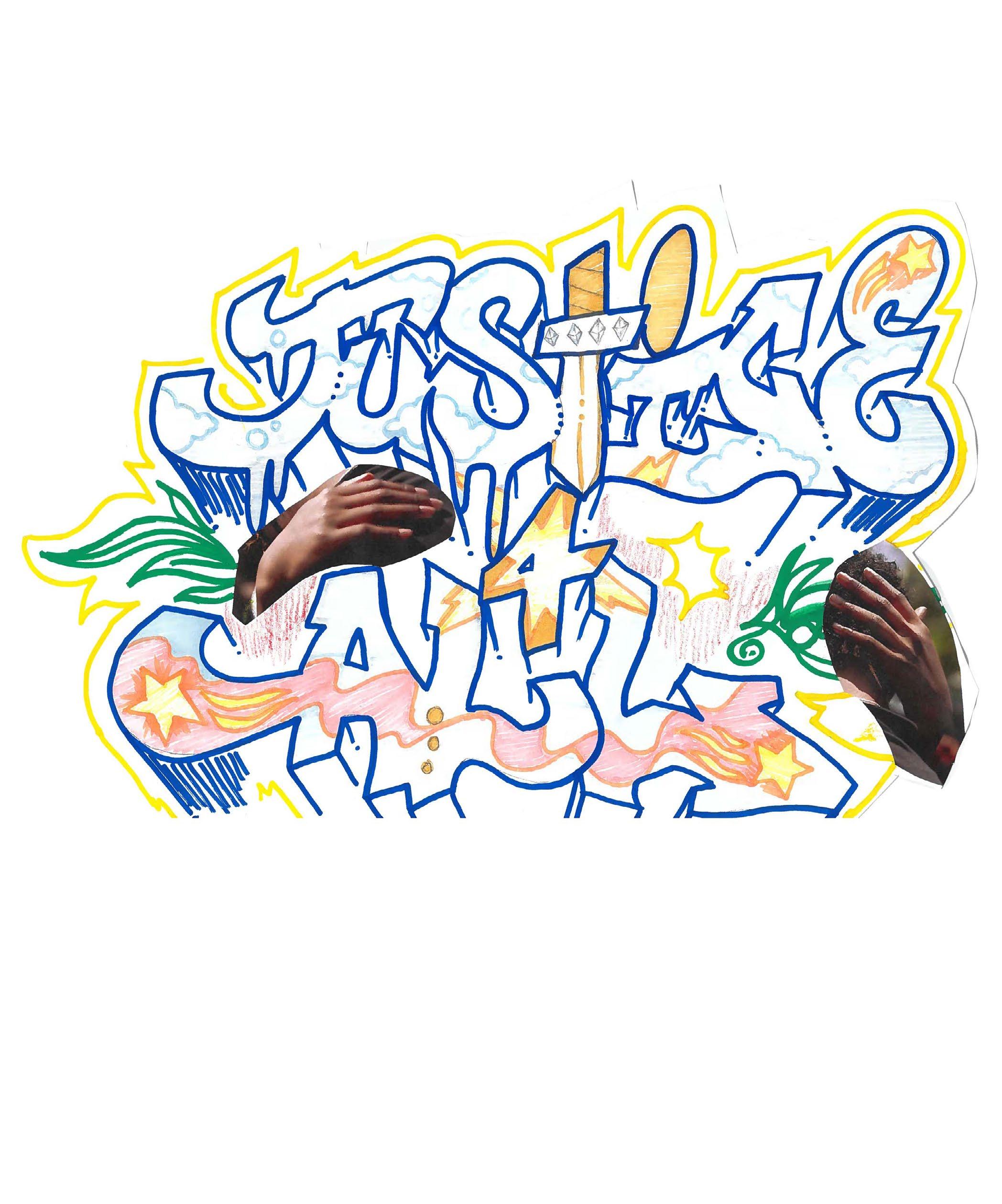
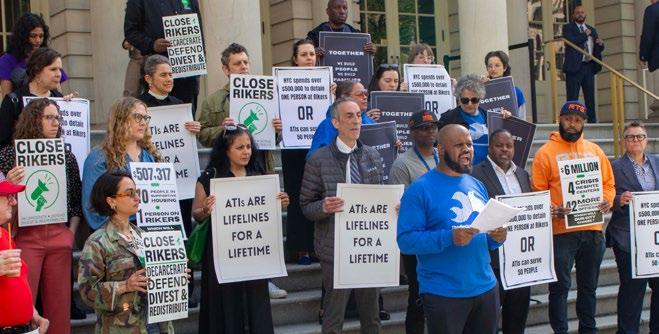
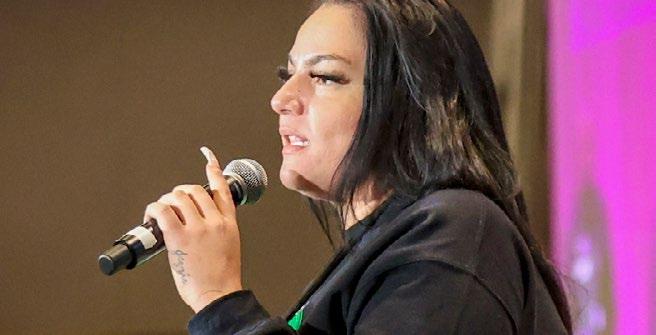




The Fortune Society’s mission is to support successful reentry from incarceration and promote alternatives to incarceration, thus strengthening the fabric of our communities. We do this by:
• BELIEVING in the power of individuals to change
• BUILDING LIVES through service programs shaped by the needs and experiences of our participants
• CHANGING MINDS through education and advocacy to promote the creation of a fair, humane, and truly rehabilitative correctional system
The Fortune Society provides culturally competent services and lifetime aftercare to people with incarceration histories. Our services include:
HOUSING
BEHAVIORAL HEALTH (Outpatient Mental Health Treatment, Outpatient Substance Use Treatment, Peer Recovery (the NEST))
SKILL BUILDING (Education, Employment Services, Digital Literacy, Creative Arts)
WELL-BEING (Food and Nutrition, Benefits Access, Healthcare Coordination, HIV/AIDS Health Services, Family Services)
DECARCERATION (Alternatives to Incarceration (ATI) & Court Advocacy, Transitional Services (RISE), Supervised Release)
ADVOCACY AND RESEARCH (The David Rothenberg Center for Public Policy (DRCPP), Center for Research, Inquiry and Social Justice (CRIS-J))





Receive




This May, Fortune hosted its first Mobile Food Pantry in collaboration with Food Bank New York City, where we provided produce, meat, canned goods, personal care items and cleaning supplies for the South Bronx community. The new Mobile Pantry will continue to serve the community monthly, meeting at the same location on the last Thursday of each month.
Fortune’s Food and Nutrition program continues to supply our community with the food and tools to lead healthier lives, allowing participants to focus on rebuilding after incarceration. They offer access to fresh produce, meat and shelf stable items, daily meal services and nutrition education workshops.
On November 14, The Fortune Society’s Creative Arts community unveiled its second exhibition at the Museum of Modern Art PS1, titled Future Freedoms. The exhibition was on view in Homeroom, a program at the museum that amplifies artists from community-based organizations, until March of this year.
Future Freedoms featured self-portraits, garments, pennants, sculptures, a music video and more, offering a deep exploration of the impact of incarceration and the necessary healing that follows. Created with artists Jenny Polak and Laura Cerón Melo as part of the Creatives Rebuild New York initiative, the exhibition demonstrated the power of creativity to imagine more just collective futures.
The Fortune Society’s Court Navigators, supported by funding from the Manhattan District Attorney’s office, provide immediate needs within New York City’s criminal legal system. This impactful initiative recruits individuals with lived experiences to connect with those who have just been released after their arraignment— a critical juncture when a judge formally presents the charges that follow an arrest. By providing compassionate guidance, food and resources, the Court Navigators help individuals navigate the often overwhelming landscape of the legal system.
Watch more on New York News 12: newyork.news12.com/fortune-society-court-navigator-programreceives-funding-from-manhattan-da

I joined the Center for Research, Inquiry and Social Justice (CRIS-J) in 2024 as a Community Health Advocate. I work with participants enrolled in our Dest2nation study, which follows individuals who are at risk of or living with HIV.
Before working with CRIS-J, I came through Fortune as a participant myself. I pull from my experiences to guide how I

I first arrived at Fortune as a participant, and I found a welcoming environment that allowed me to grow and heal after incarceration. I completed the three-week job readiness workshop and was later hired as an intern before stepping into my current role as a Community Navigator.
In my role as Community Navigator, I can pull from my lived experience to connect with potential participants and encourage them to join the Atlas
approach my work, including how I treat the participants I serve. I can tell them about my experience, and it helps me better understand what they may need because I’ve already been through it.
One of my priorities is ensuring that I treat participants with respect and dignity. When meeting with a new client, I first establish trust before beginning to discuss their health concerns. I find out if they need anything to eat, or if they have any other priorities they would like to address first, and then we work on connecting to them a healthcare provider or starting medication. I’m proud of my role at Fortune, and I’m proud to be a continued advocate and supporter for our participants.

Photo credit Vincent Verdi
I was already very involved in the Creative Arts community at Fortune, so becoming an intern, and now Program Assistant, felt like a very natural next step. I was thrilled to begin working with Jamie, Daniel and the other Creative Arts staff who had such a positive impact on me as a participant and it’s been an incredibly fulfilling experience so far.
HOPE program. Since I am familiar with their environments, my personal experiences serve as a valuable tool to engage with people and connect them to Fortune.
I am also an activist and continue to advocate for restorative justice, promoting its positive impact within the Fortune community. I first discovered my passion for restorative justice when I attended a restorative justice retreat while incarcerated. During the retreat, we discussed the importance of accountability and the need to protect our communities. This experience transformed my mindset, and I have become a more compassionate and empathetic person because of it. I carry this perspective into my work at Fortune, and I hope to inspire others with my approach.
I remember being an artist participating in weekly workshops, and I bring that unique perspective with me to my work now. I often reach out to participants for workshop ideas, and I recently came up with a clay making workshop. I feel so excited when I see people attending the workshops, and I love seeing their creative thinking in the art they create.
I was also one of the contributing artists in our “Future Freedoms” exhibition at MoMA PS1 last fall. Expressing myself creatively and being able to share such a meaningful message through art is something my soul has been searching for. Now, as a part of the Creative Arts team, I hope I can encourage and support our participants in ways the team has continued to support me.
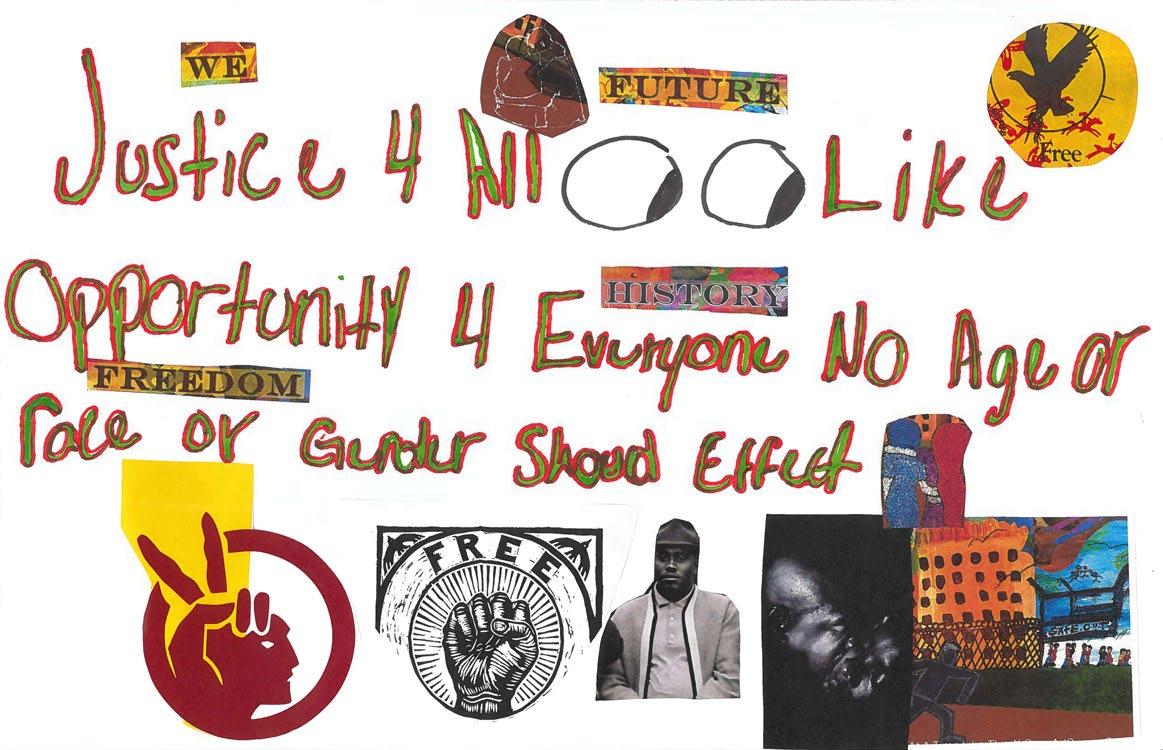
BY DAVID ROTHENBERG
credit Jaron Johnson
Justice is a word, a concept that has flirted with me for more than half a century. Let me share some tales of justice gone awry.
Jeff Deskovic was a 16-year-old living in West Chester, arrested and convicted of rape/murder. 16 years later, the Innocence Project found DNA evidence that brought him freedom. The story, as reported, suggested that justice had triumphed with Jeff’s freedom and the capture of the real crime’s perpetrator. Jeff was denied those important teen years and his 20s, when boys evolve into men, with careers, relationships, marriage and children. Significantly, Jeff told me he was a socially awkward teen, a perfect foil for quick resolve to a complex situation.
George Whitmore is the reason New York state does not have the death penalty. A young black teenager, new to New York City, stopped a police officer for information. By the evening’s end, he was the prime candidate of a grisly murder case
in which political pressure sought a fast solution. The Manhattan District Attorney stated he had information only the killer could have known. What the DA didn’t know was that George was in his hometown of Wildwood, NJ. With his coworkers he watched Martin Luther King’s “I Have a Dream” speech on television, which took place at the same time the two young women in the celebrated case were slain.
A man accused of another murder told the police he knew the real killer, made a deal with the DA, and was never arraigned. NYC had two men charged with the same crime. Whitmore was cleared but quickly charged and convicted of another crime and spent more than two years in a NY state prison. The
case provoked political uproar, and Whitmore was the poster boy of capital punishment reform. But when he came to The Fortune Society after release from prison, he was a defeated and frightened young man. A black kid alone in the big city, no advocates in his corner, he was an easy choice to create the illusion of justice.
I’ve never been able to get Danny Hogan out of my head. In the early days of The Fortune Society, he arrived at my office, an 18-year-old kid out on bail on a drug possession charge. Danny told me he witnessed the guards murder another man, and I advised him to see a lawyer.
A week later, his mother called and said Danny was picked up by the cops, tried and convicted, and sent to the maximum-security prison in Trenton. I realized that the cops, the courts and the prisons walked in concert to silence Danny Hogan.
“... when one person is denied justice, we all are participants in the charge.”
A few weeks later, a report on the radio stated an inmate in Trenton prison was scalded to death in his cell. Correction officers said his toilet backed up and hit the radiator, causing his death. Like Deskovic and Whitmore, Hogan was expendable. Justice irrelevant for all three men.
The blueprint for justice is cemented in our constitution and Bill of Rights, but when one person is denied justice, we all are participants in the charge.
Justice is a dream to be pursued.

BY REGGIE CHATMAN
David Rothenberg Center for Public Policy
The Fortune Society’s David Rothenberg Center for Public Policy aims to reform the system by ending mass incarceration, ensuring humane conditions of confinement, and promoting successful reentry. To achieve these goals, we need to challenge the way that society frames these issues. Therefore, we are intentional about the language we use to discuss the system that impacts the people and communities that we serve. One term that we want to highlight is “criminal justice system.”
“Words matter because they shape perception, understanding, actions, and outcomes.”
untrue, but it encourages us to ignore historically biased policies, such as the Rockefeller Drug Laws of the 1970s and the “tough on crime” bills of the 1990s that resulted in excessive sentencing and the mass incarceration of Black and Brown communities.
charging teenagers as adults and giving them harsh sentences. Advocates used adolescent brain science to compel legislators in different states to pass laws to change the system, by raising the age at which criminal courts could treat youth like adults. What these efforts show is that if we engage the system with the understanding that it is not inherently “just,” it emboldens us to offer critiques that may lead to substantial change.
Words matter because they shape perception, understanding, actions, and outcomes. Thus, choosing accurate language to describe a system that has led to the disproportionate incarceration of Black and Brown people and the impact on their communities is not just a matter of semantics, but an opportunity for truth-telling, real justice, and redress.
Too often, people use these words without thinking about what they actually mean. The word “justice” suggests that the system is fair, unbiased, and resolves problems in an equitable way. Not only is this
Therefore, we have made a deliberate shift to the term “criminal legal system.” This term prevents us from perceiving the system as inherently just and as moral authority. It also helps us identify the system for what it actually is, which is a set of laws, procedures, and institutions that we can critique, challenge, and change.
We have seen this with “Raise the Age” legislative campaigns where advocates challenged the racially skewed injustice of automatically
We hope you will join us in being intentional with the language that we use. We are not doing this as an exercise of political correctness, but as a necessary step toward equity and transformation. In accurately naming and defining the criminal legal system, we open the door to a deeper understanding, greater accountability, and the potential for change.


BY KIMBERLY DUNNE
Co-National Organizer, Formerly Incarcerated People and Family Movement (FICPFM), and Lead of The HHE Agenda
I come from a background shaped by hardship—a broken family, addiction, abuse and homelessness. My experiences with the justice system and the barriers I faced upon reentry fuel my passion as a national organizer, advocating for formerly incarcerated people. I know what it’s like to be released from prison with nowhere to go, no job and no access to healthcare. That is why I fight for justice—not just in words, but in real, tangible policies that make a difference in people’s lives.
Justice for all means more than just freedom from incarceration. It means coming home to real opportunities, access to housing, healthcare and
employment, and not being punished indefinitely for our past mistakes.
When I think about justice, I think about the 49 people who sat in a Section 8 housing orientation with me, only to wait years without receiving their vouchers. I think about those coming home, desperate to rebuild, yet facing rejection at every turn. Fortunately, I found resources that helped me, but today, I am the voice for those still struggling.
This is why I organize. This is why I speak out. We are not asking for handouts—we are demanding the chance to contribute, to work, to live with dignity. We are the change, the example for our future; all we need is the opportunity to succeed.
At FICPFM, we believe in building safer and healthier communities by transforming the criminal legal system and eliminating barriers to reentry. One of our core initiatives is the HHE Agenda, a comprehensive plan centered on three essential pillars:
Housing: Safe and stable housing is the foundation of successful reintegration. Yet, formerly incarcerated individuals are routinely denied housing due to background checks, financial barriers, and discriminatory policies. We push for fair housing laws,
rental assistance, and supportive housing programs to ensure no one is left without shelter upon release.
Healthcare: Many people lose healthcare coverage the moment they are released, leaving them without access to necessary medical and mental health care. This is unacceptable. We fight to expand Medicaid access, mental health support and addiction treatment programs tailored to the needs of returning citizens.
Employment: A criminal record should not be a lifetime sentence to unemployment. We advocate for fair chance hiring practices, removal of discriminatory hiring policies, and investment in job training programs to empower formerly incarcerated individuals with the skills and opportunities they need to succeed.
As a national movement, we have seen the impact of legislative victories, but we recognize that

actual change starts at the local level. With the 2024 elections reshaping policies nationwide, we are witnessing alarming cuts to housing and reentry programs. Federal rollbacks threaten access to resources that many of us rely on to rebuild our lives.
This is why FICPFM is expanding our advocacy efforts at the state and local levels. We are working directly with communities to push for housing reforms, healthcare access, and employment protections tailored to local needs. By organizing locally, we empower people most impacted by these issues to be at the forefront of change.
and employment for formerly incarcerated individuals is a fight for human dignity.
“Justice for all is not just a slogan—it is a commitment to ensuring that every person, regardless of their past, has the opportunity to thrive.”
As an organizer, I use my voice to amplify the stories of those still waiting for justice. We are not invisible. We are mothers, fathers, sisters, brothers, daughters, sons, workers and community members who deserve a fair chance. Together, we will continue to challenge policies that keep us locked out of opportunity and build a future where justice truly means justice for all.
We are the change. We are the movement. And we are just getting started. For more information about FICPFM, the initiatives we are working on and how to get involved, please visit our website, ficpfm.org.
Justice for all is not just a slogan— it is a commitment to ensuring that every person, regardless of their past, has the opportunity to thrive. The fight for housing, healthcare
If you are interested in becoming a part of our national or one of our state initiatives, you can email me directly at kimberly@ficpfm.org.
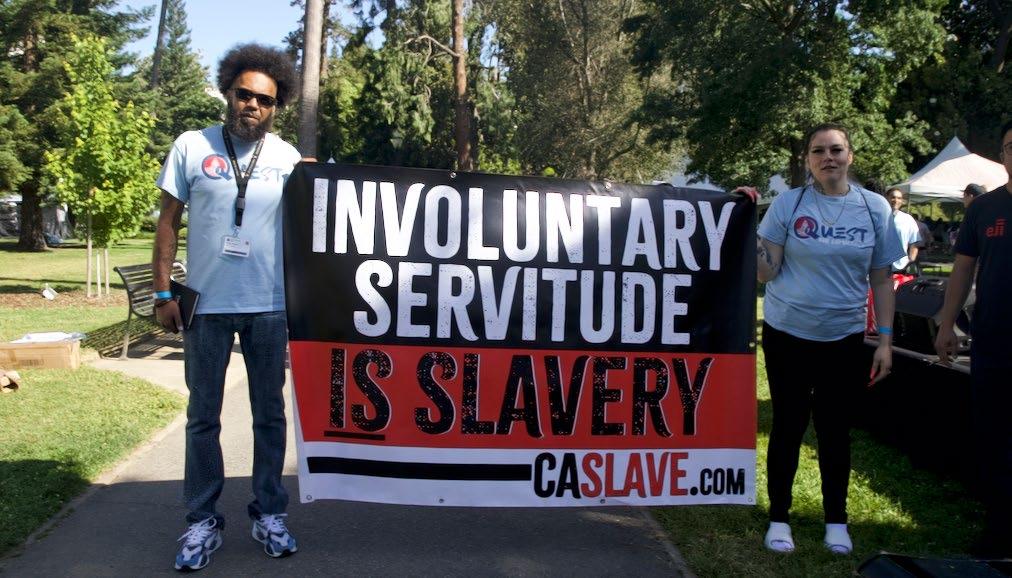

Speaking about your own experience, do you have any reflections upon when you were first incarcerated and how that might have disrupted your life plans?
I was incarcerated at age 17, charged and convicted as an adult and processed through the adult system. Putting minors in adult facilities, even with some programs peppered in for the youth, fails to protect young people and nurture their potential.
The impact of incarceration at that young age is that I carried the same stigma as any convicted adult. I was fortunate to find a job, but I saw firsthand how so many others were denied that chance, passed over because of a record they got while still – basically – kids. That early involvement with the system disrupts far more than plans, it alters the entire trajectory of a life.
We often talk about these different types of pipelines regarding people and prison, and one example is the school-to-prison pipeline. Can you explain what that is in your own words?
The school-to-prison pipeline is what happens when systemic inequality sets kids up to fail. In underfunded schools, especially in communities of color, students face overcrowded classrooms, exhausted teachers, and a lack of meaningful opportunities. The schools are under-resourced, but the expectations are still the same. There’s data showing that a child’s reading level by fifth grade can predict their likelihood of ultimately being incarcerated. Young people who experience burned out teachers, don’t have access to enrichment, stability or positive mentors who understand their lives, find themselves in an ecosystem of failure. Here at Fortune, when we talk to people about what led to their incarceration, you’ll hear the same themes: instability at home, gaps in education, few support systems and adults who didn’t pick up on their needs and missed the warning signs. That’s the “school-to-prison pipeline,” and the ultimate impact, of course, is incarceration. For many,
it’s cycling in and out of the carceral system. A drift caused by systems that failed to intervene.
Reflecting on your own life, do you ever think about moments where there could have been intervention for you as a child?
“The impact of incarceration at that young age is that I carried the same stigma as any convicted adult.”
Absolutely. I was already reading at a third-grade level in kindergarten. As time went on, I was invited into gifted and talented programs, but nothing ever came of it because at home there was no follow-through. Raised by grandma without my parents there to advocate for me, those doors just quietly closed. By eighth grade, I didn’t attend school at all. I was truant the entire year and eventually held back. That’s when I started getting involved with selling drugs and was first arrested at age 12. There were so many missed opportunities for someone to step in. The education system, child welfare system, and criminal legal system all failed me in different ways. I was performing well academically but didn’t care much about school. Specifically, though, I would point to the education system where I excelled in school, but I clearly didn’t care about my schoolwork. I passed and maintained those kinds of

“Fortune is profoundly meaningful to me; we serve as a transformative opportunity for so many individuals transitioning from jail and prison.”
grades effortlessly, so other red flags were missed. If I put more effort into school, maybe I would have had a different path.
If you felt that somebody else had an interest, like a parent or a teacher, it sounds like things might have been different. Did anyone ever reach out about that during your childhood?
There were two people in my youth who genuinely tried, both around the age of 15 and 16. One was a high school counselor, and the other was my probation officer. They tried to influence me personally and spiritually – encouraging me to hang out with a different crowd, even to attend church with one of them – but at that point I was involved in the criminal legal system, sentenced to probation, and thought selling drugs was a pathway out of poverty. Interventions earlier
in life would have likely made a difference. So, I believe the education system, the criminal legal system and the child welfare system simultaneously failed me.
Can you talk about your letter of assurance? Why would you request something like that, and how can it be helpful?
By the time I was eligible for parole, I had stacks of letters supporting my release from people in my community including friends, family and potential employers. I had participated in a number of programs including a General Business program and had mastered Microsoft Excel, Word, PowerPoint, etc. I had not only done really well in this particular program, but I was a teacher’s aide, helping others to learn to type and use the computer programs. I went before the parole board after five years and could
have been released at that point, but despite all the programs I’d participated in and the letters of support, I was denied release.
Someone suggested that I reach out to The Fortune Society for a letter of reasonable assurance (which is now framed and hangs in my office), so I did that in hopes that it would make a difference. Unfortunately, I wasn’t released until completing two-thirds of my sentence, but by word of mouth, I learned about this very special, impactful place. The Fortune Society is well-known among individuals in city and state corrections, and many who are released come here searching for an opportunity to rebuild their lives. Fortune is profoundly meaningful to me; we serve as a transformative opportunity for so many individuals transitioning from jail and prison.
BY M. ANTHONY QUILES
I am here, right now
Yet how do I maintain while I’m restrained
And prevented from experiencing the essence of life
I was then, a human made with flaws
Most imperfect and subtly unique in my inequities
Making mistakes as fate and destiny has planned
Even before my creation.

I am here, right now
Enslaved, persecuted and oppressed, depressed
From the results and infliction of the oppressors
Obsession with authority and power
At my lowest of low
Seeking and searching for the highest of highs
To escape this world beneath the world, Hellscape.
I was then,
An adolescent acquiescent to the corrupted environment
I inhabited without choice, barely capable of using the voice
Within my heart, enraged because I am so different
Entranced with the beauty of Life in all the ugliest places
Optimistic and misunderstood.
I am here, right now
Battered beaten bruised abused chewed up
Spit out been down kicked fists handcuffed feet
Stand up dust off and walk on to await the sunshine
At the end of the night in spite of all the hurt
And immense agony.
I was then,
Youthful innocent arrogant medicine fed full
Of loneliness emotional bi-polar opposites to all
I encounter with a head of thoughts,
Unlimited potential and a path of obstacles
Borders barriers attempting a stonewall stoppage.
I am here, right now
Venting the corruption not correction that occurred within me because of the power vested
In racists Bigots Tyrants and Fascists
Passive aggressive mentally indecisive
Reliant upon psychotropic substitutions of Joy and happiness, energies encapsuled
Administered in doses quoting scriptures
To control this impulsive irrational bashful
Modest honest monstrosity.
Who’s sitting standing sitting and standing
In confusion, perused and enthused in learning change
From books, stained by tears of pain to refrain becoming a jailbird
In flight, delighted by delicacies of prescription drugs
When all i ever wanted was Freedom to be Me.

Art credit Hector Rodriguez
See your writing in the next edition of the Fortune News!
IN THE NEXT ISSUE:
Health and Wellness – Are you able to keep healthy while incarcerated? If so, how? Is health a priority for you? Do you think mental and physical health are aligned? How have food options and quality affected mealtimes? Do prison/jail conditions make it more challenging to practice wellness, and in what ways? What opportunities have you had to learn wellness or culinary skills? Do you have any tips or hacks to stay healthy during incarceration?
Send written (800 words or less) or visual art responses to: development@ fortunesociety.org or mail them to: Fortune News Editors c/o The Fortune Society 29-76 Northern Boulevard Long Island City, NY 11101
I was then, confused
I am here, right now
Confused
I was then lost in a sea so vast but at last
I am here, right now.

D.O.O.R.S. is an inclusive community within the Justice Care and Opportunities Department, designed to help system-impacted people thrive and fully participate in society. D.O.O.R.S provides an array of comprehensive supportive services to address the barriers to reentry for system-involved individuals, particularly those on adult felony supervision, their families and the community. Services are provided by county partners and community-based organizations, including housing, employment, support, substance use treatment and more.
jcod.lacounty.gov/program/d-o-o-r-s-community-reentry-center

Marian House is a transitional and permanent housing and support services program for homeless women and their children located in Baltimore City. The program also offers additional services including counseling, substance use treatment, educational services and family reunification to assist women as they build stable and independent lives.
rivierabch.com/The-Reentry-Center

Operation New Hope offers wraparound services for individuals after release from incarceration. Aimed at empowering system-impacted people and their families, their programs and services provide relevant job-readiness training and build self-sufficiency.
operationnewhope.org
GEORGIA MENTAL HEALTH CONSUMER NETWORK

Ready4Reentry Forensic Peer Mentor Training Program is an initiative to train individuals with lived experience of behavioral health challenges and involvement in the criminal justice system. The program provides peer support, recovery support, referrals to partnering reentry organizations and more.
gmhcn.org/ready-for-reentry

The Re-Entry Employment Service Program (RESP) serves Illinoisans who are currently, or have in the past been, subject to any stage of the criminal justice process and who require assistance in overcoming barriers to employment resulting from a record of arrest or conviction.
ides.illinois.gov/jobsworkforce/programs/re-entry

Reentry Services at Step Up, Inc. is designed to improve the health and well-being of formerly incarcerated people. They work with clients to create a personal care plan aimed at providing wraparound services like mental health and substance use treatment, employment services and more.
stepupin.org/services/reentry-program

Center for Employment Opportunities (CEO) offers individuals returning home from incarceration the ongoing support necessary to build career capital and financial stability through job readiness training, transitional employment, job coaching and more.
ceoworks.org

Housing Works is a nonprofit organization that provides housing for low-income and system impacted people living with HIV/AIDS in NYC. They also offer legal services, health services, harm reduction and a job-readiness program.
housingworks.org
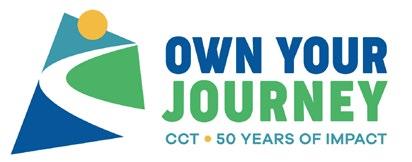
The Center for Community Transitions is a nonprofit organization that intends to help formerly incarcerated people lead healthy, productive lives, primarily focusing on employment assistance. They offer a job readiness workshop, networking opportunities, case management and referrals.
centerforcommunitytransitions.org/programs/lifeworks
Center for Employment Opportunities (CEO) offers individuals returning home from incarceration the ongoing support necessary to build career capital and financial stability through job readiness training, transitional employment, job coaching and more.
ceoworks.org

Unlocking Doors is a reentry brokerage, providing navigation and monitoring services to system-impacted people. They work with a network of community organizations and service providers that serve as referrals for clients. Individuals interested in enrolling in Unlocking Doors must first complete an application process, including a one-time payment of $10.
unlockingdoors.org

Virginia CARES (Community Action Re-Entry System) offer services to system-impacted people both currently and formerly incarcerated. As a statewide network of community organizations, Virginia CARES provides critical services like housing and employment assistance, substance use treatment and more.
hopeforprisoners.org
The Fortune News is free to all people who are incarcerated.
To subscribe, please fill out the subscription form and send to:
Fortune News Subscriptions
c/o The Fortune Society 29-76 Northern Boulevard Long Island City, NY 11101
If you are not incarcerated, please send a $30 subscription fee along with your form. Subscriptions must be renewed once a year for paid subscribers.
If you are a person who is incarcerated and has been transferred, please renew your free subscription. Please allow four to six weeks for us to process your request.